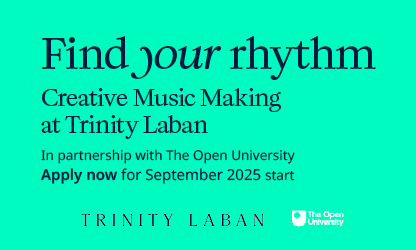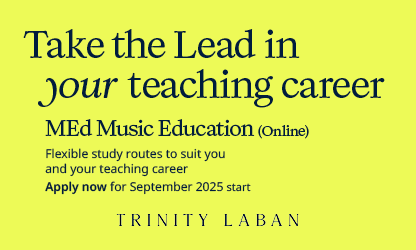You play anyway because the music is so good' - Adopt a Composer blog
I first heard about ‘Adopt A Composer’ as an anxious teenager who had absolutely no idea how to realise my ambitions; the name fell into my distracted ears while trying to revise for my AS Levels with BBC Radio 3 on in the background (a terrible attempt at multitasking).
I was by this point utterly obsessed with composing, often spending hours glued to the keyboard late into the night when I was supposed to be doing clever things on a calculator. Prior to this, I had had my heart set on being an orchestral oboist or a piano accompanist and, although torn between the arts and sciences, the arts always won the battle for my time. Then, possibly due to practising irresponsibly for auditions and concerts, I damaged a nerve in my right arm and ceased playing altogether for several months. My main creative outlet was suddenly gone.
Composition rescued me. I think without it I might not have got through my A-Levels, and indeed because of it I reluctantly went to university having remonstrated for years about being forced into a rigid educational system when entrepreneurship was a far more attractive option. Now, having benefitted hugely from five years of higher education, I have finally lived up to my teenage standards by becoming a freelance, full-time composer. The arrogance of a seventeen-year-old can be immense, but I knew myself well enough to hit on the best career choice available to me: self-employment.
That career option was first apparent to me because of those three words: Adopt A Composer. I hadn’t even an inkling that composers could be adopted, or in residence, or commissioned via any other means than Simon Rattle calling you up personally and saying “Hello, I need a new didgeridoo, euphonium and kazoo triple concerto for the Berlin Phil, can you get it to me Tuesday after next?”
A new understanding gradually unfolded after I heard about Making Music’s initiative that year, and I discovered piece by piece how it might be possible to write music 9-5 and not have to work bar shifts to keep the fridge stocked, and how I might be able to really get to know the ensembles I write for. I’m still discovering this now, and it means I have plenty of adventures, with my collaboration with Merchant Sinfonia being the next one! It is especially exciting to work with them as opportunities to write for orchestras are few and far between (unless you are Tom Adès or Kaiya Saariaho).
An integral part of this adoption process is the chance to spend time with 75 musicians who turn up every week because they want to. Amateur music-making can be undervalued in professional spheres, but really it has some qualities that the pros sometimes miss out on: everyone is there because they usually enjoy themselves and because they believe in the group around them, and there’s not so much competition or ego involved.
In a sense, music wins: you might know that you’ll never sound like Rostropovich but you play anyway because the music is so good.
And the people around you likely feel the same. In some ways I am glad that I can’t become a professional oboist because this gives me the means to participate fully in amateur music: I know what it feels like to not produce quite the sound you hear in your head, and what it feels like to have performance nerves and not enjoy playing solos, and also what it feels like to make something beautiful with a group of people who aren’t soloists either, and who didn’t have much time to practice in the past few years, and who might not perform in Wigmore Hall but have played at their sister’s wedding.
I hope to make something with Merchant Sinfonia that does justice to their love of music and to the individual commitment that each of them makes weekly, and that perhaps also reveals an aspect of their strengths and potential as a group that may have not been previously apparent.
To do so, I will spend many sessions getting to know them and talking with them about their history so that we can celebrate their 10th Anniversary while embarking on the next decade in an uplifting and ground-breaking way. I hope they will challenge me positively too, so that together we can research new ways of making music.



